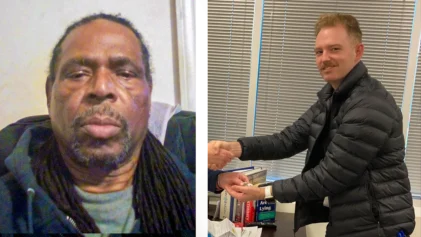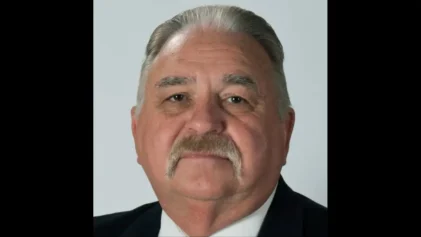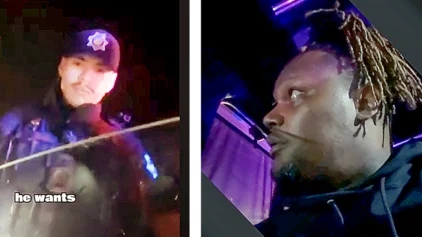“This was the tightest election in history,” said Elizabeth Hordge-Freeman.
The 2022 election in Brazil mirrors the 2020 election in the United States, as the country’s defiant, boisterous, brash, and conservative President Jair Bolsonaro was voted out of office in favor of progressive President-elect Luiz Inacio Lula Da Silva.
The election was called on Oct. 30, 2022, by a razor-thin margin, Bolsonaro’s 49.1 percent to Silva’s 50.9 percent.
“Even though Bolsonaro lost, still have a lot of work to do especially for Black people in Brazil,” said Anielle Franco, an Afro-Brazilian professor and director of the Marielle Franco Institute, named after her slain sister.
Franco says ever since Bolsonaro assumed power after winning the presidency in 2018, his policies have proved challenging for Brazilians of African descent.
“Every 23-minutes, we have a Black person being assassinated here, and they never said a word, now that he [Bolsonaro] lost, they say, now the country is going to die. They were going to die if you were in power, and all that crazy stuff so we’re going to have a lot of hard times going over this and these four years will be very hard for Lula,” Franco said.
Franco references Bolsonaro’s administration’s unwillingness to address the plight of Black Brazilians, especially the violence, poverty and access to economic opportunity adversely affecting the Brazilians of African-descent.
A 2017 United Nations Brazil campaign highlighted the high death rate among Black men killed in Brazil as reported by the Federal District. It says, “[The] campaign aims to show the relationships between racism and violence in the country.”
“We can talk about the ways Bolsonaro has been antagonistic to indigenous groups, to Black groups, women’s rights. If we look at the funding that has been allocated to women’s rights, I think the numbers suggests that they were cut by 90 percent,” said Hordge-Freeman.
In the immediate days following his electoral defeat, Bolsonaro refused to concede his election bid and instead chose to remain unusually quiet. In the limited instances Bolsonaro spoke publicly, he thanked his supporters which exceeded 58 million and encouraged protests.
Some of Bolsonaro’s supporters included truckers who blocked highways until the federal government stepped in. They also questioned the validity of the election results the AP reported.
“When you have a far-right leader who is pro-torture, who is pro-being adamant about not supporting equality, it creates a culture that normalizes misogyny, racism, and sexism and that’s what we see in Brazil so the folks on the street talking about Lula should leave or die, that’s really a reaction to the negative and polarizing discourse we’ve seen promoted by Bolsonaro since day one,” said Hordge-Freeman.
“We’ve been facing a lot of manifestations in Brazil towards Bolsonaro saying our elected system didn’t work,” Franco said of the conditions on the ground in Brazil in the days following Bolsonaro’s electoral defeat.
Franco, who is living in Rio De Janeiro, has felt the impact of Bolsonaro’s stranglehold on society, not just from the ongoing protesters who support him, but also the loss of her slain sister, Marielle Franco.
Marielle Franco was a progressive that advocated for poorer communities, LGBTQ, women’s, and human rights. In 2016, she was elected to Rio De Janeiro’s City Council, but on March 14, 2018, she was assassinated. Many blame Bolsonaro for her death, including her sister, Anielle.
“When they killed my sister, my sister became this big symbol for Brazil, Black women and Black people,” Anielle Franco said. She also accused Bolsonaro’s sons of spreading lies surrounding her death in the wake of Marielle’s assassination. “They kept saying she was a drug dealer, and they created this fantasy on their minds and they kept going,” Anielle Franco added.
Marielle Franco was just one of many Black Brazilians fighting for equality for people of African-descent, in a country where generations of racism stifled economic and social progress for Black Brazilians dating back to the abolishment of slavery in 1888.
Over the years groups representing Black resistance have advocated for inclusion, including the Movimento Negro Unifcado in the 1970s to Black Coalition for Rights, which is considered one of the largest social movements aimed at confronting racism in Brazil today.
“We’ve had our Black movement for many many years but ever since 2020 with George Floyd, and 2018 with my sister, and Breonna and all of that, we are doing so much that even Angela Davis said when she came in 2019, y’all are looking at me, but y’all should be looking at Black women in Brazil,” Anielle Franco said.
With Bolsonaro soon to be replaced by Lula Da Silva, many Brazilians of African-descent, which make up nearly 56 percent, or roughly 119 million people, according to the Brazilian Institute of Geography and Statistics, are cautiously optimistic their day-to-day lives will eventually see improvement.
A 2017 study by Oxfam, which focuses on global poverty, estimated Black people in Brazil earn half the income as whites and wage equality would not come until 2089.
“What the hope is, Lula’s administration creates an opening for more women to feel empowered and more Black folks to feel like they should also be engaged in politics,” Hordge-Freeman said.
Hordge-Freeman is an associate professor of sociology at the University of South Florida, and she says Lula Da Silva as a progressive has a history of working with a wide range of people and is seen as a uniter. She believes his political background could help elevate Brazilians of African-descent into better prosperity.
“Community building, he has a history of being successful at that, so I think folks are hopeful that he’ll leverage that to lead to a Brazil where you have less polarization,” Hordge-Freeman said.
Lula Da Silva has been in Brazilian politics for decades; he first ran for office in 1982 when he lost a gubernatorial bid. In the 1986 elections, Silva won himself a seat in Congress.
He served two terms as president in Brazil from 2003 to 2010 and, according to ABC news, he “left office with an 80% approval rating.” In 2018, he could not run for president because he was imprisoned although the conviction was later thrown out.
During Lula Da Silva’s tenure as president, Hordge-Freeman says he was credited for the passage of the Bolsa Familia program, which was a conditional cash transfer program that infused monthly payments into the homes of impoverished and disproportionately Black families provided that their children attended school and received regular vaccinations.
“This was partially responsible for lifting millions out of poverty and reducing poverty levels in Brazil,” Hordge-Freeman said.
Other programs created under Lula Da Silva’s presidency include the Secretariat for Policies Promoting Racial Equality, which “promote racial equality, with an emphasis on the African American population and other ethnic segments of the Brazilian population,” according to Latinno, Innovations for Democracy in Latin America.
He also signed law 10.639, which mandated Afro-Brazilian history be taught in schools.
The conciliatory nature many perceive Lula Da Silva to have contrasted with the brash personality of Bolsonaro draws many comparisons to the 2020 election within the U.S. between former President Donald Trump, and President Joe Biden.
Hordge-Freeman takes the comparison between the two country’s elections further by saying Lula Da Silva, like Biden, faces conservative opposition in Congress, which will make fulfilling his more progressive policies difficult to pass into law.
Lula Da Silva campaigned on a platform which include social justice, environmental protection, defending democracy and uniting the country.
“In the same way that Bolsonaro has been referred to as the Trump of the Tropics, some folks have referred to Lula as Brazil’s Biden, in the sense that you have a more leftist and progressive leader who’s facing a conservative congress that’s going to make it very difficult,” Hordge-Freeman said.
Despite the difficult road ahead for Lula Da Silva in united a divided country along party lines, both Hordge-Freeman and Franco are cautiously optimistic he can at least make some progress that can help improve the lives of the millions of Brazilians of African-descent.
Franco says when she got the chance to convey a message to President-Elect Lula Da Silva she made it known, she wants to see non-white Brazilians included in decisions affecting the country.
“His staff is full of white people, I said to him myself, we don’t want to be building your government, we want to be inside of it building with you,” Aniel


